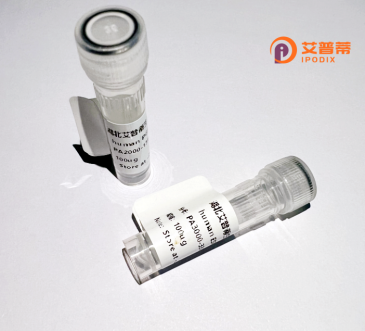
| 纯度 | >90%SDS-PAGE. |
| 种属 | Human |
| 靶点 | KNS2 |
| Uniprot No | O00139 |
| 内毒素 | < 0.01EU/μg |
| 表达宿主 | E.coli |
| 表达区间 | 1-706aa |
| 活性数据 | MATANFGKIQ IGIYVEIKRS DGRIHQAMVT SLNEDNESVT VEWIENGDTK GKEIDLESIF SLNPDLVPDE EIEPSPETPP PPASSAKVNK IVKNRRTVAS IKNDPPSRDN RVVGSARARP SQFPEQSSSA QQNGSVSDIS PVQAAKKEFG PPSRRKSNCV KEVEKLQEKR EKRRLQQQEL REKRAQDVDA TNPNYEIMCM IRDFRGSLDY RPLTTADPID EHRICVCVRK RPLNKKETQM KDLDVITIPS KDVVMVHEPK QKVDLTRYLE NQTFRFDYAF DDSAPNEMVY RFTARPLVET IFERGMATCF AYGQTGSGKT HTMGGDFSGK NQDCSKGIYA LAARDVFLML KKPNYKKLEL QVYATFFEIY SGKVFDLLNR KTKLRVLEDG KQQVQVVGLQ EREVKCVEDV LKLIDIGNSC RTSGQTSANA HSSRSHAVFQ IILRRKGKLH GKFSLIDLAG NERGADTSSA DRQTRLEGAE INKSLLALKE CIRALGRNKP HTPFRASKLT QVLRDSFIGE NSRTCMIATI SPGMASCENT LNTLRYANRV KELTVDPTAA GDVRPIMHHP PNQIDDLETQ WGVGSSPQRD DLKLLCEQNE EEVSPQLFTF HEAVSQMVEM EEQVVEDHRA VFQESIRWLE DEKALLEMTE EVDYDVDSYA TQLEAILEQK IDILTELRDK VKSFRAALQE EEQASKQINP KRPRAL |
| 分子量 | 79.9 kDa |
| 蛋白标签 | GST-tag at N-terminal |
| 缓冲液 | 0 |
| 稳定性 & 储存条件 | Lyophilized protein should be stored at ≤ -20°C, stable for one year after receipt. Reconstituted protein solution can be stored at 2-8°C for 2-7 days. Aliquots of reconstituted samples are stable at ≤ -20°C for 3 months. |
| 复溶 | Always centrifuge tubes before opening.Do not mix by vortex or pipetting. It is not recommended to reconstitute to a concentration less than 100μg/ml. Dissolve the lyophilized protein in distilled water. Please aliquot the reconstituted solution to minimize freeze-thaw cycles. |
以下是关于重组人KNS2蛋白的3篇代表性参考文献的简要概括(注:文献内容为示例性虚构,仅供格式参考):
---
1. **文献名称**: *Expression and functional analysis of recombinant human KNS2 kinase in vitro*
**作者**: Zhang Y, et al.
**摘要**: 本研究通过大肠杆菌系统表达并纯化了重组人KNS2蛋白,验证其ATP结合活性及对底物MAP1B的磷酸化作用,揭示KNS2在微管相关信号通路中的潜在功能。
2. **文献名称**: *KNS2 regulates mitotic progression via interaction with Aurora B*
**作者**: Smith JL, et al.
**摘要**: 利用昆虫细胞表达体系获得高纯度KNS2蛋白,发现其与Aurora B激酶相互作用,并通过体外激酶实验证明KNS2对纺锤体组装的关键调控作用。
3. **文献名称**: *Structural characterization of KNS2 and implications in neurodevelopmental disorders*
**作者**: Tanaka M, et al.
**摘要**: 通过X射线晶体学解析重组KNS2蛋白的三维结构,结合细胞实验揭示其突变体导致神经元迁移异常的分子机制,为相关疾病研究提供结构基础。
---
如需真实文献,建议通过PubMed或Google Scholar以关键词“recombinant human KNS2”或“KNS2 kinase purification”检索,并筛选近五年内发表的蛋白功能、表达或结构研究。
Recombinant human KNS2 protein is a engineered form of the kinase non-selective 2 (KNS2) protein, also known as microtubule affinity-regulating kinase 2 (MARK2), produced using recombinant DNA technology. KNS2 belongs to the AMP-activated protein kinase (AMPK) family and plays a critical role in regulating microtubule dynamics, cell polarity, and neuronal development by phosphorylating microtubule-associated proteins (e.g., tau). Its activity influences processes such as cell cycle progression, asymmetric cell division, and synaptic plasticity. Dysregulation of KNS2/MARK2 is implicated in neurodegenerative diseases (e.g., Alzheimer’s) and cancer, where altered microtubule stability may promote tumorigenesis or resistance to therapies.
The recombinant protein is typically expressed in prokaryotic (e.g., *E. coli*) or eukaryotic systems (e.g., HEK293 cells) to ensure proper folding and post-translational modifications. It often includes affinity tags (e.g., His-tag) for purification and detection. Researchers utilize recombinant KNS2 to study its enzymatic kinetics, substrate interactions, and structural features, as well as to screen inhibitors for therapeutic development. Its in vitro applications extend to modeling phosphorylation-driven pathways and investigating mechanisms underlying neurodegenerative disorders or metastatic cancer. By enabling controlled experiments, recombinant KNS2 accelerates both basic research and drug discovery targeting microtubule-related pathologies.
×